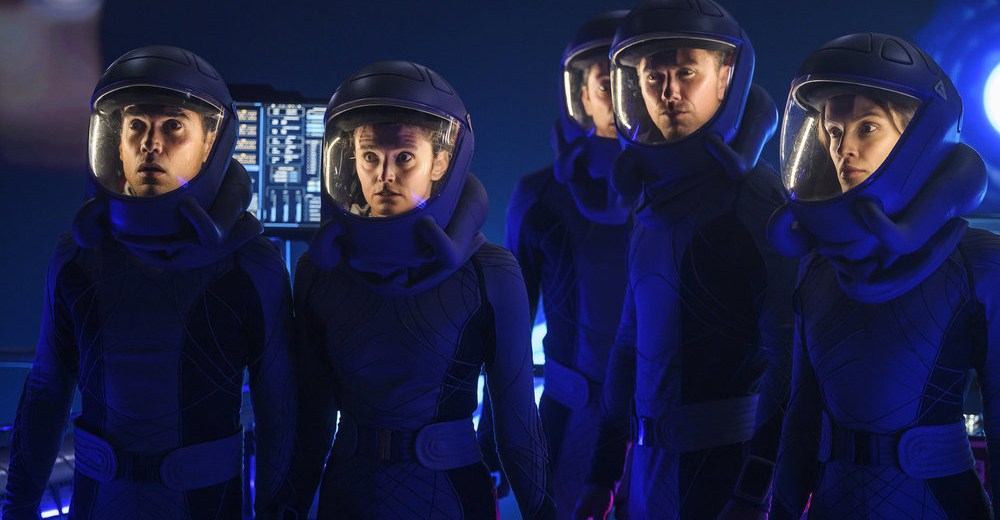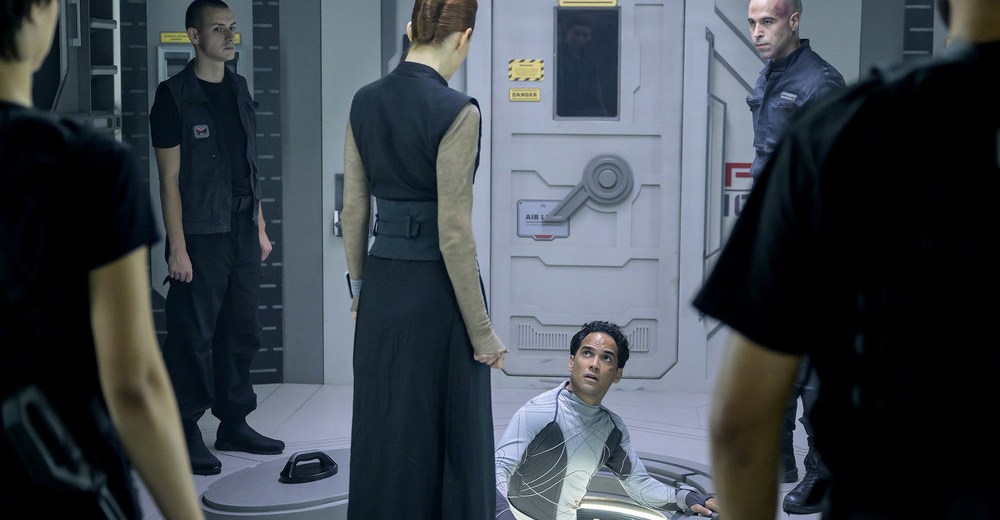The Ark is a perfect throwback to an age when sci-fi didn’t have to be so serious

During the last few years, space epics have ruled streaming and the small screen. Shows like The Expanse, For All Mankind, and Foundation have won awards, provoked profound conversations, and made sci-fi fans out of skeptics. Building on the legacies of earlier series like the critically acclaimed 2004 reboot of Battlestar Galactica, these space operas prove that science fiction can be prestige TV.
But sci-fi can also be trash (complimentary), and if that’s what you’re looking for, The Ark delivers. Unlike the recent slate of dramatic space operas, the Syfy show brings the camp, the humor, and the hokeyness. Currently in its second season, The Ark fills a void in the current landscape of on-screen science fiction and harkens back to a time when the genre wasn’t afraid to laugh at itself.
In a tale as old as Star Trek, The Ark follows a ship of human refugees from a future uninhabitable Earth who unexpectedly wake up mid-flight and must work together to reach their destination: planet Proxima b. Everyone in the core crew neatly fits a sci-fi archetype: There’s the no-nonsense, level-headed captain, Sharon Garnet; the right-hand man, Lt. Spencer Lane; the wise-cracking pilot, Lt. James Brice; the geek girl, Alicia Nevins; the guy who knows how to grow food in space, Angus Medford; the overworked doctor, Sanjivni Kabir; the head of security who’s a secret softy, Felix Strickland; and the savant engineer with something to hide, Eva Markovic. Together, they fix many dire ship malfunctions, uncover secrets about what happened to humankind during the crew’s interrupted stasis, and discover that they aren’t the only people who escaped to space.
The Ark’s showrunners, Dean Devlin and Jonathan Glassner, are no strangers to science fiction. Devlin wrote and produced Stargate, and Glassner created Stargate SG-1 in addition to writing for Star Trek: Voyager and The Outer Limits. So it’s no surprise that The Ark makes use of every sci-fi trope in the book. But it feels fresh in how it’s modernized the sensibilities of the past (the cast is diverse, with queer characters whose queerness is just a fact, not a storyline) and in how unafraid it is to be lighthearted. It’s throwback fun and it all works; rather than feeling stale, the series is familiar and comforting. In a 2023 Syfy Wire interview, Devlin affirms, “If you love real classic science fiction, the kind of stuff that Jonathan and I fell in love with, our show is a love letter to those kind of shows.” With The Ark, you know exactly what to expect, and that’s part of the appeal.

The series succeeds in part because it takes advantage of a tried-and-true formula: Each episode begins with a cliched sci-fi problem the crew has to solve. (Oh no! Everyone on the ship is hallucinating! Aw jeez, someone is stuck in the airlock!) Our heroes solve the mystery and find a fix by the last five minutes of the episode. (The crew accidentally drank contaminated water! Tech-savvy Alicia opened the airlock doors!) And then, in the last 30 seconds, a new mystery is introduced, ending the episode on a cliffhanger. (A new ship just popped into the sky!) The Ark always leaves viewers wanting more.
The show does sometimes veer into “it’s so bad, it’s good” territory. The theme music is comically upbeat. The acting is anywhere from pretty good to hilariously bad. And some of the plot points have literally made me laugh out loud — a major revelation in season 1 is that a main character has a disease called “Klampkins.” But most of the time, the show is good, just a different kind of good than its more self-serious peers.
The Ark is fundamentally optimistic in a way that many contemporary sci-fi epics aren’t. The point of this show is human connection, not necessarily deep, existential exploration. And the series pulls this off really well, particularly in season 2. In episode 4, “The Other You,” the crew of Ark-1 encounters an alternate reality where viewers meet different versions of the main characters. “Parallel universe” episodes in science fiction are typically fertile ground for exploring weighty themes, but not for The Ark. The writers play the alternate-reality scenario for a laugh (despite a heart-wrenching performance from Christie Burke, who plays Captain Garnet), and the episode is a fun romp, not a crisis of self. Will the alternate universe ever be mentioned again? Probably not, and that’s OK! In the 2023 Syfy Wire interview, Glassner speaks to the show’s optimism: “What’s the point of fighting for your life if your life isn’t any fun, any good, anyway? I think that’s kind of the attitude our characters have.”
The Ark’s magic combo of a great formula, levity, and hokeyness keeps bringing folks back. The first season reached 6.5 million viewers, suggesting that while the show’s critically acclaimed counterparts can certainly attract audiences, sci-fi fans also yearn for a show that’s just a silly time. If you’re searching for a new science fiction show with intricate world-building that challenges your point of view, The Ark isn’t that. But if you want a series blissfully devoid of major surprises that will make you laugh and yell at the screen, The Ark just might be your new favorite show.
The Ark is now streaming on Peacock.




